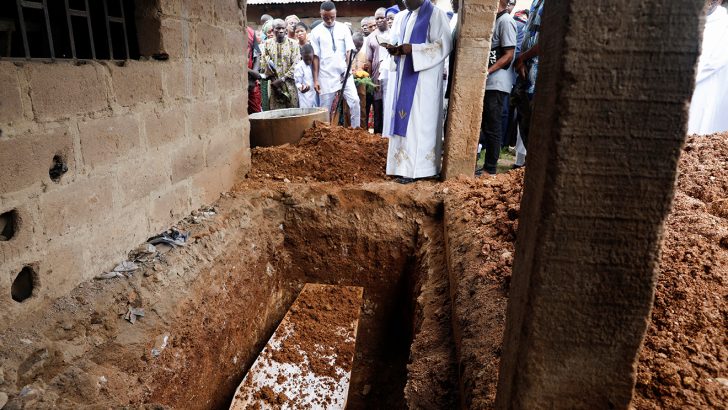The Catholics attending Mass at St Francis Xavier Church on Pentecost did not know how much it would cost to participate in the suffering of Jesus, said Bishop Emmanuel Badejo of Oyo.
“How much do we understand when he says to us, ‘The time is coming when anyone who kills you will think he is doing a holy service to God,’” Bishop Badejo said, quoting from the Gospel of St John at the June 17 funeral Mass for many of the victims of the massacre at the church. “We had no idea perhaps till now what extreme form that could take.”
Hundreds gathered for the funeral and burial of many of the victims – at least 50 were killed when gunmen spent 20-25 minutes in the church June 5. Among those at the Mass in the St Francis parish hall were Bishop Jude Arogundade of Ondo, the diocese in which Owo is located, as well as Ondo Gov. Arakunrin Akeredolu.
Bishop Badejo named some of those killed in the massacre: Bridget Ozulumba, 85; Chukwuemeka Emmanuel Njoku, 2; and Mathilda Ogungbade, 3.
“None of these did anything wrong, except that they came to worship God at the foot of the cross and altar on that day,” said Bishop Badejo. “There, sudden death was inflicted upon them, and deep sorrow upon their dear ones left behind. These dear ones died, and many others met with trouble while at the foot of the cross.”
“People of God, here before us lies Nigeria,” the bishop said, noting that the dead were not alone.
“Lying down here with them are the joys and hopes and aspirations of their families and loved ones, of the Church of God, of the various communities from where they come, and indeed, of this country, Nigeria. The circumstances of their death are by all standards of sane humanity, most illogical, irrational and unacceptable. Even the ones who are maimed and wounded themselves, wherever they are, represent Nigeria with all her self-inflicted wounds, bruised, brutalised and violated.”
“Our Christian faith, strong as it is, is thoroughly tested when we remember that the massacre we have just faced is not an isolated case in our country, and that we see little … to indicate that it might be the last. It has been a long, bloody list, always growing over the last 30-odd years,” he said, reciting a litany of deaths beginning with riots in 1987 in northern Nigeria and ongoing kidnappings today.
As a group and individually, Nigerian bishops repeatedly have criticised government officials for doing nothing to stem the nation’s increasing violence and insecurity.


 A priest prays over a casket during a burial outside St Francis Xavier Church in Owo, Nigeria, June 17, 2022. Photo: CNS.
A priest prays over a casket during a burial outside St Francis Xavier Church in Owo, Nigeria, June 17, 2022. Photo: CNS.